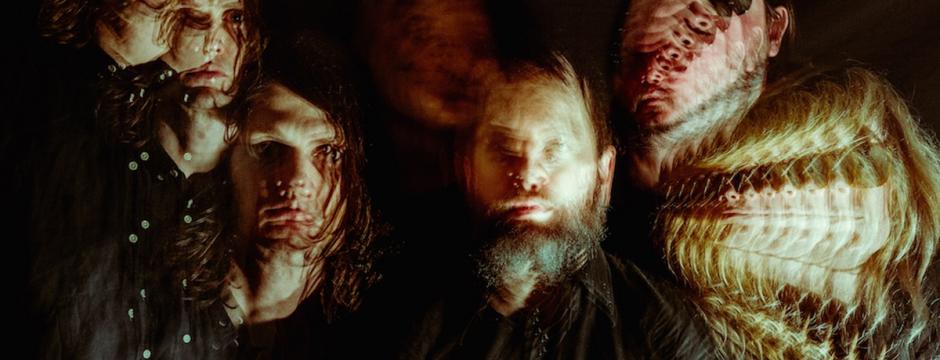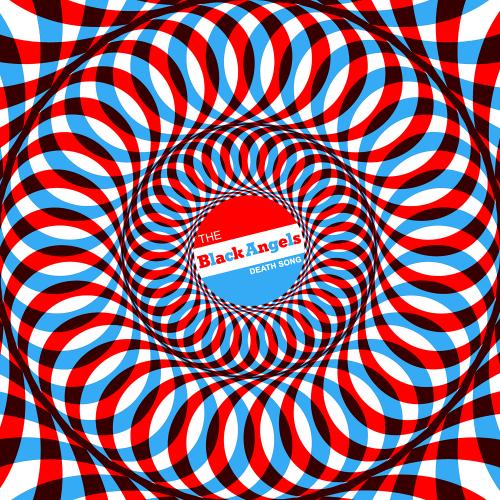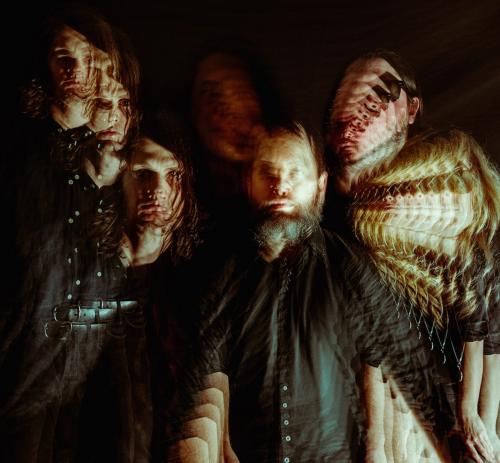Band: The Black Angels
Album: Death Song
VÖ: 21.04.2017
Label: Partisan Records / Pias
Website: http://theblackangels.com/
"If you're going to sing something, it might as well be something important," reflects The Black Angels' Alex Maas.
That ethos is the pulsing heartbeat of 'Death Song,' the Austin neo-psych rockers' first new album in four years and their most fully realized work to date. Written well before the vitriolic election cycle and the uncertainty left in its wake, these songs now form an uncanny soundtrack to our modern American climate of division and anxiety, wrapping up the personal and the political into dense layers of provocative insight. Part protest, part emotional catharsis, this is a troubled record for troubled times, and in that sense, it's classic Black Angels.
"Our music has always been driven by the fear of the unknown and what's to come," explains Maas. "Growing up in Texas, in the Bible Belt, you'd have this feeling as a kid in church on Sundays that your whole entire world was just hanging by a string."
On 'Death Song,' the band explores what happens when that string snaps. Volatile, fuzzed-out guitars and crashing percussion meet swirling, reverberating vocals in a cinematic tempest of distrust and disgust. Attraction and self-loathing, greed and desire, faith and brutality are all intertwined, as the lyrics explore the kind of timeless questions that have dogged mankind for eternity. How much ugliness are we willing to perpetuate in the quest for beauty? Can we ever truly share what's inside of our hearts? How long can we subject ourselves to the same self-destructive cycles before everything comes collapsing down around us?
"We're just observers,' says guitarist Christian Bland. "We reflect back what we see in the world like a mirror, and hopefully that helps open up people's minds and eyes to the issues that are important to us."
Produced by Phil Ek (Father John Misty, Fleet Foxes, The Shins), 'Death Song' is without a doubt The Black Angels' most political record since their 2006 debut LP, 'Passover.' Hailed as "the most powerful album of the year" in an NPR roundup by KEXP's John Richards, 'Passover' hit like "a time warp to the underground anti-establishment songs of the late 60's" and introduced the band as the "undisputed avatars of contemporary psychedelic rock," according to Austin City Limits. It's a title they more than lived up to over the ensuing decade, releasing a string of critically acclaimed albums and building up a massive international fanbase. Billboard praised the "quantum power" of 2008's 'Directions To See A Ghost,' while Rolling Stone raved that it combined "the drilling guitars of early Velvet Underground shows, the raga inflections of late-show Fillmore jams, [and] the acid-prayer stomp of…the 13th Floor Elevators." The band cracked the Top 100 on the Billboard charts for the first time with 2010's 'Phosphene Dream,' which the BBC called the "rock album of the year," and followed it up in 2013 with "Indigo Meadow," produced by fellow Texan John Congleton and exalted by Mojo for "perfectly [balancing] melody with noise."
While the band's studio discography earned rapturous attention, their live show elevated the music to new and ecstatic heights. On stage, The New York Times said, they "play psychedelic rock as if the 1960's never ended, and they are absolute masters of it." The band toured with everyone from The Black Keys and Queens of the Stone Age and Wolfmother, in addition to backing psych pioneer Roky Erickson, taking over the airwaves with electrifying television performances on Letterman, Conan, and ACL, and slaying festival crowds at Coachella, Bonnaroo, Glastonbury, Lollapalooza, Fuji Rock, Primavera, and more. As if performing wasn't enough, The Black Angels co-founded their own festival called Levitation (formerly Austin Psych Fest), which has grown into one of the best-reviewed and most expertly-curated musical gatherings in the country, hosting everyone from Brian Wilson to the Jesus and Mary Chain since launching in 2008.
"The festival and the people it attracts go way beyond psychedelic music," explains Maas, "and I think this record does, too. It's definitely got its moments, but I don't consider this a psychedelic record. It's rock and roll."
Album opener "Currency" sets the stage in an explosive way, with ground-shaking low end and searing guitar riffs. "Print and print the money that you spend / Spend and spend the money that you print," Maas sings in a hypnotic near-chant. Taken literally, it's a reference to the Fed and the smoke and mirrors that prop up our monetary system, but the magic of the Black Angels lies in their ability to layer meaning upon meaning. Step back and it's a song about our consumer culture. Step back further and it's a song about temptation and the desires that draw us to the brink of ruin.
As the album unfolds, subsequent tracks reveal similar self-perpetuating cycles. Romance, violence, religion, health; for The Black Angels, everything is connected. "What potion are you after / First love then the disaster," Maas sings on "Medicine," a track inspired by our reliance on prescription pills to solve all of our woes (including the woes created by our reliance on prescription pills). On "I'd Kill For Her,' Maas steps inside of the mind of a man driven by the twisted belief that there's beauty in brutality, while "Half Believing" tackles modern apathy and commitment, and "Grab As Much As You Can" is a musing on the nature of greed.
"We're all fiends for something," Maas reflects, "whether it's Cheetos or heroin or money or love. Whatever it is that people are hooked on, they'll do terrible things, they'll do whatever it takes to get it and to keep it."
If there's a way out of the mess in which we find ourselves, though, 'Death Song' suggests that it's not through consumption, but rather through creation. The surreal, Krautrock-influenced "I Dreamt" envisions a reality in which our true inner selves can be shared through artistic expression, and in that sharing, a new, more harmonious way forward is revealed. "I dreamt that you dreamt that I dreamt with you," Maas sings, mixing reality and fantasy and the internal and the external so thoroughly as to render the distinctions between them meaningless.
"You can use art to show people how you think the world should be," Maas explains. "You can encourage them to dream what you dream and feel what you feel. If people act on those dreams and give them meaning, artists have the power to change the way the world thinks."
A lofty aspiration, to be sure, but that's precisely the kind of artistic ambition these extraordinary times call for. After all, if you're going to sing something, it might as well be something important.
The Black Angels are:
Stephanie Bailey: drums, percussion, Philicorda
Christian Bland: guitar, Mellotron, bass, vocals, Vox Continental
Jake Garcia: guitar, bass, vocals
Kyle Hunt: bass, guitar, organ, Moog, Rheem MK VII
Alex Maas: lead vocals, bass, harmonium


